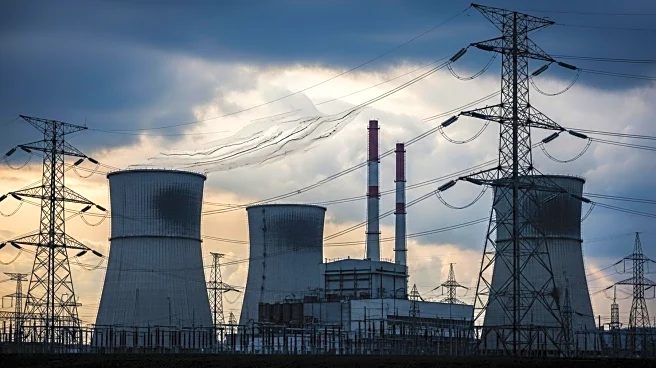What's Happening?
The Zaporizhzhia nuclear power plant in Ukraine, Europe's largest, is experiencing its longest power outage since the onset of the war. Captured by Russian forces early in the conflict, the plant no longer supplies power to the grid but requires electricity to cool its six inactive reactors and spent fuel. Emergency generators are currently maintaining operations, but the situation is deemed 'critical' by Ukrainian President Volodymyr Zelenskyy. The International Atomic Energy Agency (IAEA) has emphasized the need to restore reliable external power to ensure nuclear safety. The plant's reactors have been shut down for over three years, reducing the risk of a major incident, but a complete loss of power could lead to fuel overheating if cooling systems fail.
Why It's Important?
The prolonged power outage at Zaporizhzhia underscores the vulnerability of nuclear facilities in conflict zones. The reliance on emergency generators poses a significant risk, as any disruption could escalate the threat of overheating and potential radiation release. The situation evokes memories of the Chernobyl disaster, highlighting the importance of maintaining nuclear safety standards. The ongoing conflict complicates efforts to restore power, with fighting blocking access to repair lines. The geopolitical implications are significant, as Russia's control over the plant and the annexation of surrounding regions remain contested internationally.
What's Next?
Efforts to restore external power to Zaporizhzhia are ongoing, with the IAEA engaging in talks with Russian and Ukrainian officials. The plant's reliance on diesel generators is unsustainable, and ensuring fuel deliveries is crucial to prevent a total blackout. The situation remains precarious, with the potential for further escalation if backup systems fail. The international community continues to monitor developments, emphasizing the need for a resolution to ensure nuclear safety in the region.
Beyond the Headlines
The Zaporizhzhia power outage highlights the broader challenges of managing nuclear facilities in conflict zones. The situation raises ethical and safety concerns about the use of nuclear technology in unstable regions. The geopolitical tensions surrounding the plant's control and the annexation of surrounding areas reflect the complex interplay of military and energy strategies in the region.










